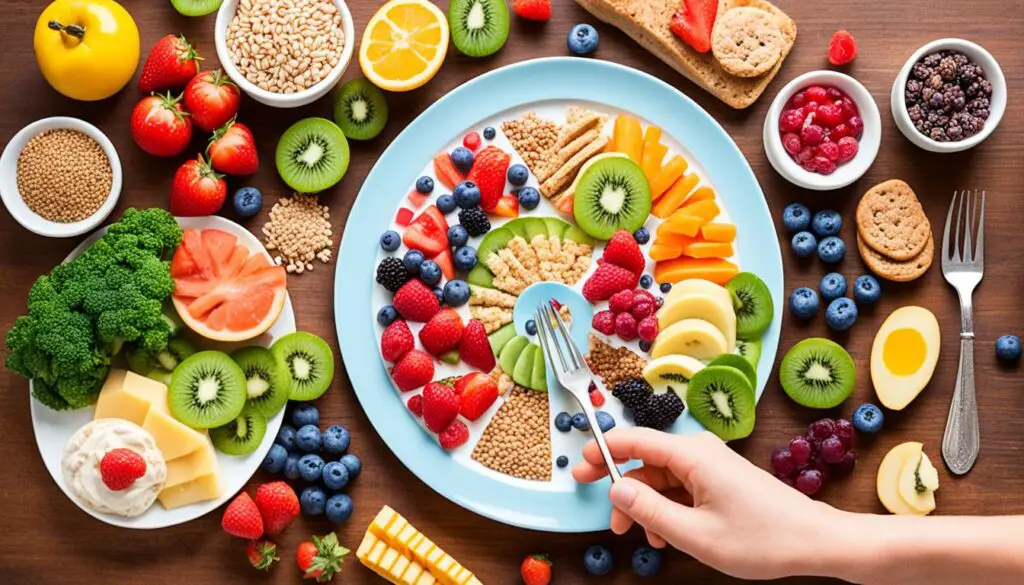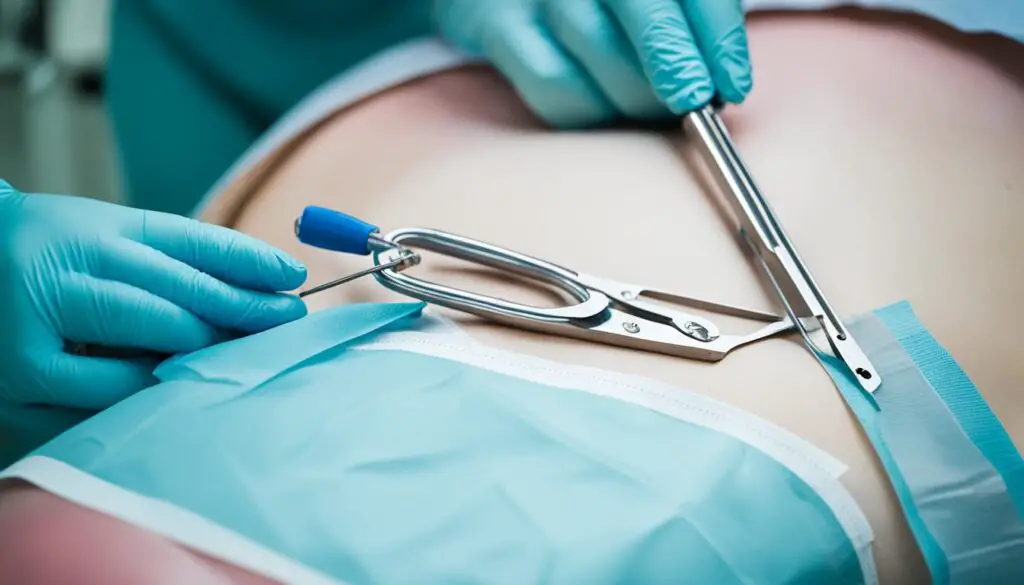Are you one of the many individuals who have successfully lost weight with the HCG diet only to find it difficult to maintain your weight afterwards? You’re not alone. In fact, more than 80% of people face challenges when it comes to long-term weight management post HCG.
The HCG diet, which combines calorie restriction with HCG injections, has proven to be an effective method for shedding unwanted pounds. However, once the diet is completed, maintaining the weight loss becomes a new struggle altogether.
In this article, I will explore the reasons why so many individuals find it difficult to maintain their weight after completing the HCG diet. I will also provide you with practical tips and strategies for long-term weight management, so you can maintain your hard-earned results and achieve lasting success.
Key Takeaways:
- Over 80% of individuals struggle to maintain weight loss after completing the HCG diet.
- The HCG diet combines calorie restriction with HCG injections for effective weight loss.
- Weight maintenance after HCG is challenging due to the body’s reaction to increased calorie intake.
- Gradually increasing calorie intake, reintroducing normal foods, and implementing an exercise routine are essential for long-term weight management.
- Seeking medical supervision and adopting lifelong healthy habits are key factors in maintaining weight loss post HCG.
Understanding the HCG Diet
https://www.youtube.com/watch?v=mJzl6NheRYk
The HCG diet is a weight loss approach that combines calorie restriction and regular injections of Human Chorionic Gonadotropin (HCG). During the diet, individuals are advised to consume 500 to 800 calories per day while receiving HCG injections. The purpose of these injections is to stimulate the release of stored fat, resulting in weight loss.
Calorie restriction is a key component of the HCG diet. By limiting calorie intake, the body is forced to utilize its fat stores for energy, leading to rapid weight loss. The HCG injections help preserve muscle mass and suppress hunger, making the low-calorie diet more manageable for individuals.
However, it is important to note that the HCG diet is not a long-term solution for weight management. While it can be effective for short-term weight loss, many individuals struggle to maintain their weight after completing the diet. The restricted calorie intake during the HCG diet can temporarily alter the body’s metabolism, making it challenging to adapt to a regular calorie intake without gaining weight.
Additionally, the HCG diet is not supported by scientific evidence and has been met with skepticism by medical professionals. The United States Food and Drug Administration (FDA) has warned against the use of over-the-counter HCG products for weight loss, stating that they are not effective and can pose health risks.
While the HCG diet may provide initial weight loss results, it is crucial for individuals to implement sustainable lifestyle changes and adopt healthy eating habits for long-term weight management. Gradually increasing calorie intake, reintroducing a balanced diet, and establishing a regular exercise routine are essential steps in achieving lasting weight loss and overall well-being.
By understanding the basics of the HCG diet and its limitations, individuals can make informed decisions about their weight loss journey and explore healthier alternatives for achieving their goals.
Challenges with Weight Maintenance After HCG

After completing the HCG diet and experiencing significant weight loss, many individuals find it difficult to maintain their weight. This is often due to the body’s reaction to the sudden increase in calorie intake after a period of calorie restriction. The body may go into a mode of holding onto calories, leading to weight gain. In order to maintain weight loss after HCG, dietary and lifestyle adjustments are necessary.
The Effects of Calorie Restriction and Weight Gain
During the HCG diet, individuals adhere to a strict caloric intake of 500 to 800 calories per day. This drastic calorie restriction leads to rapid and significant weight loss. However, when the diet ends and a normal calorie intake is resumed, the body may react by storing calories more efficiently, resulting in weight gain. The body’s metabolism may also slow down in response to the calorie restriction, making it even more challenging to maintain weight loss.
Dietary Adjustments for Weight Maintenance
To address the challenges with weight maintenance after HCG, making dietary adjustments is crucial. It is important to focus on consuming a balanced diet that is rich in nutrients and supports long-term weight management. Incorporating lean proteins, whole grains, fruits, and vegetables can help maintain satiety and provide the necessary nutrients for optimal health.
Additionally, portion control plays a significant role in weight maintenance. Paying attention to portion sizes and practicing mindful eating can help prevent overconsumption and weight gain. Avoiding sugary beverages, processed foods, and excessive intake of fats and added sugars is also essential in maintaining weight loss after HCG.
Lifestyle Changes for Weight Maintenance
Besides dietary adjustments, lifestyle changes are crucial in maintaining weight loss after HCG. Regular physical activity is important for maintaining a healthy weight. Engaging in regular exercise, such as aerobic activities, strength training, or a combination of both, can help burn calories, build muscle, and increase metabolism.
Furthermore, adequate sleep and stress management are vital in weight maintenance. Lack of sleep and chronic stress can disrupt hormonal balance, leading to increased appetite, cravings, and weight gain. Prioritizing quality sleep and adopting stress-reducing techniques, such as meditation or relaxation exercises, can positively impact weight management.
Support and Accountability
Having a support system can greatly contribute to successful weight maintenance after HCG. Enlisting the help of a registered dietitian, weight loss coach, or participating in a weight management program can provide guidance, accountability, and motivation. Additionally, joining support groups or online communities with individuals who have undergone similar experiences can offer encouragement, tips, and advice for long-term weight management.
By making dietary and lifestyle adjustments, individuals can overcome the challenges of weight maintenance after HCG and achieve long-term success in their weight management journey.
Gradual Increase of Calorie Intake
After completing the HCG diet, it is crucial to approach the transition to a regular diet with caution. Gradually increasing your calorie intake is key to avoiding shocking the body and promoting weight gain. By starting with a modest increase of 200 calories per day and gradually working your way up to the recommended daily calorie intake, your body can adjust more smoothly.
The optimal number of calories for weight maintenance after HCG can be calculated based on your body weight and activity level. It is important to consult with a healthcare professional or registered dietitian to determine the optimal calorie amount for your specific needs.
Transitioning back to a normal diet after the HCG diet requires a gradual transition. This allows your body to adapt to the increased calorie intake without triggering unwanted weight gain. Remember, the key is to be patient and consistent throughout the process.
“Gradually increasing calorie intake after HCG allows the body to adjust without promoting weight gain.”*
Benefits of Gradual Transition:
- Minimizes the risk of weight regain
- Promotes a stable metabolism
- Allows your body to adjust to increased food intake
- Reduces the likelihood of feeling overwhelmed or deprived
Additionally, gradually increasing calorie intake provides an opportunity to reintroduce a wider variety of foods back into your daily meals. This helps in achieving a more balanced and sustainable approach to eating.
By incorporating this gradual process into your post-HCG journey, you can achieve long-term weight management and ensure a successful transition to a healthy, balanced diet. Remember to consult with a healthcare professional or registered dietitian for personalized guidance throughout this process.
Reintroducing Normal Diet Routine

After completing the HCG diet, it’s time to gradually reintroduce sugars and starchy foods back into your regular eating routine. It’s important to approach this process with moderation and mindfulness, ensuring a smooth transition while still maintaining the progress you’ve made. By following a few key principles and monitoring your weight, you can successfully incorporate these foods back into your diet without jeopardizing your long-term weight management goals.
Begin by selecting low-carb and low-fat options as you reintroduce sugars and starchy foods. This will help ease your body into processing these types of foods again, avoiding any sudden spikes in blood sugar levels. Focus on whole grains, fruits, and vegetables to provide a healthy source of carbohydrates and fiber, while minimizing added sugars and unhealthy fats.
It’s crucial to be attentive to your body’s response during this transition phase. Monitor your weight regularly and make adjustments if necessary. Remember that weight fluctuations are normal during this period as your body adapts to the reintroduction of sugars and starchy foods. Patience is key, as it may take up to nine weeks for a complete metabolism reset.
“Gradually reintroducing sugars and starchy foods helps your body readjust without risking weight gain. Monitoring your weight and making adjustments if needed is essential during this process.”
Stay mindful of portion sizes and practice moderation while incorporating sugars and starchy foods back into your diet. Be aware of the nutritional value and potential impact on your overall calorie intake. Balancing these foods with lean proteins, healthy fats, and plenty of vegetables can help create a well-rounded and balanced diet.
Remember that reestablishing a normal diet routine after the HCG diet is a journey of finding balance and making sustainable choices. It’s essential to prioritize your long-term weight management goals and listen to your body’s needs throughout the process.
| Reintroducing Sugars and Starchy Foods | Moderation | Monitoring Weight |
|---|---|---|
| Start with low-carb and low-fat options | Practice portion control and moderation | Regularly weigh yourself and track progress |
| Focus on whole grains, fruits, and vegetables | Avoid excessive intake of added sugars and unhealthy fats | Be patient, as weight fluctuations are normal during this period |
| Gradually increase portion sizes and diversify food choices | Balance sugary and starchy foods with lean proteins and healthy fats | Adjust your diet as needed based on weight monitoring |
Formulating an Exercise Routine
Exercise plays a vital role in long-term weight management after completing the HCG diet. It helps not only in maintaining weight loss but also in promoting overall health. After the HCG diet phase, it is recommended to engage in regular physical activity to prevent weight regain. The type and intensity of exercise can vary based on personal preference and fitness level.
For optimal results, individuals should aim for at least 75 minutes of vigorous exercise or 150 minutes of moderate exercise per week. Vigorous exercises can include activities such as running, HIIT workouts, or cycling at a high intensity. Moderate exercises can include brisk walking, swimming, or dancing.
Cardiovascular exercises, such as jogging or using cardio machines, are commonly recommended as they help in burning calories and improving overall cardiovascular health. Resistance exercises, which include weightlifting or using resistance bands, can help in building lean muscle mass and increasing metabolism.
Remember, any activity that aligns with your lifestyle and interests can be beneficial for maintaining weight loss. The key is to find activities that you enjoy and can sustain in the long run.
Regular exercise not only aids in weight management but also offers numerous other health benefits, including reduced risk of chronic diseases, improved mental well-being, and increased energy levels. It is important to consult a healthcare professional before beginning any new exercise routine, especially if you have any underlying health conditions.
Benefits of Exercise Post HCG Diet:
- Promotes calorie expenditure, aiding in weight maintenance
- Improves cardiovascular health and endurance
- Builds lean muscle mass, increasing metabolism
- Enhances mood and mental well-being
- Boosts energy levels and overall fitness
Remember to start gradually if you have been inactive or have not exercised regularly. It is important to listen to your body, avoid overexertion, and allow for adequate rest and recovery. Finding a balance between challenging yourself and avoiding injury is crucial.
| Exercise Type | Description |
|---|---|
| Cardiovascular Exercise | Includes activities that elevate heart rate and increase calorie burn. Examples: running, cycling, swimming, aerobics. |
| Resistance Exercise | Involves using weights or resistance bands to build strength and muscle. Examples: weightlifting, bodyweight exercises, resistance band workouts. |
| Flexibility Exercises | Focuses on improving range of motion and joint flexibility. Examples: yoga, stretching, Pilates. |
| Functional Training | Emphasizes movements that mimic everyday activities. Examples: kettlebell exercises, TRX training, stability ball workouts. |
Importance of Medical Supervision

When embarking on a weight loss journey, particularly with the HCG diet, it is crucial to prioritize safety and effectiveness. That’s where medical supervision comes in. Seeking the guidance of healthcare professionals who offer medically supervised HCG programs can provide you with the support and expertise needed to achieve your weight loss goals. Authorized clinics specializing in the HCG diet ensure that you are in the hands of trained professionals who can monitor your progress and make any necessary adjustments to optimize your results.
Consulting with a healthcare professional is essential, as they can determine if the HCG diet is appropriate for you based on your unique medical history and individual needs. They will provide you with comprehensive guidance throughout the entire process, answering your questions and ensuring you are well-informed every step of the way.
Benefits of Medically Supervised HCG Programs
Medically supervised HCG programs offer numerous advantages that contribute to a safer and more successful weight loss journey. Here are some key benefits:
- Personalized approach: Healthcare professionals tailor the HCG program to your specific needs, taking into consideration your medical history, body composition, and weight loss goals.
- Monitoring and support: Regular check-ins and consultations with medical professionals allow for ongoing monitoring of your progress, ensuring that you stay on track and addressing any concerns or challenges that may arise.
- Enhanced safety: Under medical supervision, potential risks and side effects can be identified early on and managed appropriately, minimizing any adverse effects.
- Accountability and motivation: Having a dedicated healthcare team by your side provides invaluable support, motivation, and accountability, increasing your chances of long-term success.
“The guidance and expertise provided by medical professionals in authorized clinics are crucial for the safe and effective implementation of the HCG diet.”
Remember, your health and well-being should always be a priority. By choosing a medically supervised HCG program from an authorized clinic, you can ensure that you are embarking on your weight loss journey with the right support and guidance. Prioritize safety, optimize your results, and enjoy the reassurance of being in the hands of qualified professionals throughout the process.
Find an Authorized Clinic for Medically Supervised HCG Programs
When seeking a medically supervised HCG program, it is essential to choose an authorized clinic that adheres to strict guidelines and standards. Look for clinics that have a proven track record of success and positive patient testimonials. Research the clinic’s certifications and credentials to ensure they operate under the supervision of qualified healthcare professionals.
Here are some tips for finding an authorized clinic:
- Consult with your primary care physician or trusted healthcare professional, who can provide recommendations or referrals to authorized clinics in your area.
- Search online directories and review platforms to find authorized clinics near you, paying attention to reviews and ratings from previous patients.
- Check the clinic’s website for information about their accreditation, medical team, and expertise in the HCG diet.
- Contact the clinic directly to inquire about their programs, services, and consultation process.
- Schedule a consultation with the clinic to get a firsthand experience and assess if they are a good fit for your needs and expectations.
Remember, the HCG diet journey is best undertaken under the guidance and supervision of medical professionals. Choose an authorized clinic that prioritizes your health, safety, and long-term success.
| Benefits of Medical Supervision for HCG Diet | Find an Authorized Clinic |
|---|---|
| Personalized approach | Consult with your primary care physician or trusted healthcare professional |
| Monitoring and support | Search online directories and review platforms |
| Enhanced safety | Check the clinic’s website for information |
| Accountability and motivation | Contact the clinic directly |
| Schedule a consultation |
Choosing a medically supervised HCG program from an authorized clinic is the key to a safe and effective weight loss journey. Take the necessary steps to find the right clinic for you, and embrace the guidance and support of qualified healthcare professionals who will help you achieve your weight loss goals while prioritizing your health and well-being.
HCG Diet Safety Concerns

When considering the HCG diet, it is vital to be aware of the safety concerns associated with this weight loss method. The U.S. Food and Drug Administration (FDA) has issued a warning against the use of over-the-counter HCG products, stating that they are not effective for weight loss and can pose serious risks to health.
Research has linked HCG weight-loss products to an increased risk of certain types of cancers. These products have not undergone thorough testing and regulation to ensure their safety and efficacy. It is important to prioritize your health and explore alternative, safer ways to achieve your weight loss goals.
In addition to the potential cancer risks, severe calorie restriction, which is a key component of the HCG diet, can lead to other health risks. Gallstone formation is a common concern, as rapid weight loss can disrupt the balance of cholesterol and bile salts in the gallbladder. Another risk is an imbalance of electrolytes, which can lead to dehydration and other adverse effects on bodily functions.
Instead of relying on the HCG diet, it is advisable to explore sustainable and evidence-based approaches to weight loss that prioritize both effectiveness and safety. Consult with a healthcare professional who can guide you towards healthier alternatives and develop a personalized plan that suits your specific needs.
HCG Diet Safety Concerns: Key Points
- The FDA warns against over-the-counter HCG products for weight loss.
- Research suggests an increased risk of certain cancers with HCG weight-loss products.
- Severe calorie restriction can lead to gallstone formation and electrolyte imbalances.
- Explore alternative, safer ways to achieve your weight loss goals.
| Risks | Consequences |
|---|---|
| Cancer risks | Potential link between HCG products and certain types of cancers |
| Gallstone formation | Rapid weight loss can disrupt gallbladder function |
| Electrolyte imbalances | Severe calorie restriction can lead to dehydration and imbalances |
It’s essential to prioritize your health and explore safe and effective methods to achieve and maintain weight loss. Choose approaches that are sustainable, evidence-based, and supported by healthcare professionals. By making informed choices, you can work towards your weight loss goals while safeguarding your well-being.
Importance of Healthy Transition and Lifelong Habits

The HCG diet is not just a temporary weight loss solution; it can also serve as a valuable teacher, providing individuals with new ways of eating and looking at food. However, the real challenge lies in making a healthy transition after completing the HCG diet and establishing lifelong eating habits that support long-term weight management.
To ensure a successful transition, it is crucial to prioritize hydration and gradually increase calorie intake based on your final weight. Staying hydrated supports overall health and aids in maintaining a balanced metabolism. Gradually increasing calorie intake allows your body to adjust to a higher calorie load without triggering weight gain.
Another important aspect of transitioning after HCG is to take daily multivitamins. While the HCG diet may have provided necessary nutrients during your weight loss journey, a transition phase might require additional supplementation to support your body’s nutritional needs. Consult with a healthcare professional to determine the type and dosage of multivitamins that align with your specific needs.
Transitioning after the HCG diet is not just about the physical aspects; it also requires a patient mindset. The maintenance phase can be challenging, as your body adjusts to a new way of eating and weight management. Patience is key during this period, as it may take time for your metabolism to stabilize and for you to find the right balance of calorie intake and physical activity.
By adopting these habits – staying hydrated, gradually increasing calorie intake, taking daily multivitamins, and being patient during the maintenance phase – you can increase your chances of successful long-term weight management. Remember, the HCG diet is just the beginning of your weight loss journey, and the skills and lessons learned need to be translated into lifelong habits for sustained results.
Surgical Options for Weight Loss Maintenance

In some cases, individuals may consider surgical options for weight loss maintenance, such as tummy tuck surgery, liposuction, and Renuvion skin tightening. These procedures can help remove excess skin and improve body contour after significant weight loss. It is important to consult with a qualified healthcare professional to determine if surgical treatments are appropriate and explore all available options.
When it comes to surgical treatments for weight loss, there are several options available. These procedures can not only address the issue of excess skin but also help individuals achieve the desired body contour they’ve worked so hard to achieve. Let’s take a closer look at each of these surgical options:
| Procedure | Description |
|---|---|
| Tummy Tuck | A tummy tuck, also known as abdominoplasty, is a surgical procedure that removes excess skin and fat from the abdomen. It can also help repair weakened or separated abdominal muscles, resulting in a flatter and more toned stomach. |
| Liposuction | Liposuction is a procedure that removes excess fat deposits from specific areas of the body using suction. It can be performed on various areas, including the abdomen, hips, thighs, arms, and neck. Liposuction can help contour the body and improve overall body shape. |
| Renuvion Skin Tightening | Renuvion is a minimally invasive procedure that uses a combination of radiofrequency energy and helium plasma to tighten loose skin. It can be used on different areas of the body, such as the abdomen, arms, thighs, and neck, to achieve a smoother and firmer appearance. |
It is crucial to consult with a qualified healthcare professional who specializes in weight loss treatments to determine if surgical options are appropriate for your specific needs and goals. They will evaluate your overall health, discuss the potential risks and benefits, and guide you through the decision-making process.
It’s important to note that surgical treatments for weight loss maintenance should not be considered as a standalone solution. They are best utilized in conjunction with other healthy lifestyle habits, such as regular exercise, balanced nutrition, and ongoing medical supervision.
The Benefits of Surgical Treatments for Weight Loss Maintenance
Surgical treatments for weight loss maintenance offer several benefits, including:
- Removal of excess skin: After significant weight loss, excess skin can be a common aesthetic concern. Surgical procedures like tummy tuck and liposuction can effectively eliminate this excess skin, resulting in a more contoured and proportionate appearance.
- Improved body shape: Surgical treatments can help reshape and enhance specific areas of the body, allowing individuals to achieve their desired body shape and proportions.
- Boost in self-confidence: Many individuals experience a significant increase in self-confidence and self-esteem after undergoing surgical treatments for weight loss maintenance. Removing excess skin and achieving a more sculpted physique can have a positive impact on one’s body image.
It’s important to keep in mind that surgical treatments come with potential risks and considerations. The decision to undergo surgery should be made after a thorough assessment of individual health, lifestyle factors, and personal goals.
Remember, surgical options should be considered as a complementary approach to a healthy lifestyle and should not replace ongoing efforts to maintain weight through proper diet and exercise. It’s essential to work closely with a healthcare professional to create a comprehensive plan that addresses both the surgical and non-surgical aspects of weight loss maintenance.
Conclusion
Long-term weight management after HCG is achievable through a combination of healthy habits. By gradually increasing calorie intake, reintroducing normal foods, engaging in regular exercise, seeking medical supervision, and adopting a sustainable approach to eating, individuals can successfully maintain their weight loss and embrace a healthier future.
Long-term weight management requires a shift in mindset from quick fixes to lifelong habits. It is important to prioritize health over temporary solutions and focus on maintaining a healthy lifestyle. By making conscious choices and being mindful of portion sizes, individuals can keep off the pounds they worked hard to lose.
Maintaining weight loss is not just about the numbers on the scale but also about overall well-being. The adoption of healthy, sustainable eating habits can provide the necessary foundation for long-term success. From nourishing the body with whole foods to staying active and finding joy in movement, every small step counts towards a healthier, happier future.
Remember, long-term weight management is a journey, and it requires patience and dedication. With the right strategies and a commitment to embracing a healthy lifestyle, individuals can achieve lasting success in maintaining their weight loss and enjoying all the benefits that come with it.
FAQ
What is the HCG diet?
The HCG diet involves a combination of calorie restriction and regular injections of Human Chorionic Gonadotropin (HCG) to stimulate weight loss.
Why do people struggle with weight maintenance after completing the HCG diet?
After the HCG diet, the body may react to the sudden increase in calorie intake by holding onto calories, leading to weight gain.
How can calorie intake be gradually increased after completing the HCG diet?
To avoid shocking the body, it is important to start with a gradual increase of 200 calories per day and work up to the recommended daily calorie intake.
How should normal foods be reintroduced after the HCG diet?
It is important to start with low-carb and low-fat options, monitor weight, and make adjustments if necessary.
What is the recommended exercise routine after completing the HCG diet?
It is recommended to engage in at least 75 minutes of vigorous exercise or 150 minutes of moderate exercise per week to maintain weight loss.
How important is medical supervision during the HCG diet?
Seeking medical supervision ensures safety and effective results. Look for authorized clinics that offer medically supervised HCG programs.
What are the safety concerns surrounding the HCG diet?
The FDA has warned against over-the-counter HCG products and severe calorie restriction. Risks include an increased risk of certain cancers and adverse side effects.
How can a healthy transition and lifelong habits be established after the HCG diet?
It is important to stay hydrated, gradually increase calorie intake based on weight, take daily multivitamins, and be patient during the maintenance phase.
Are there surgical options for weight loss maintenance after HCG?
Yes, surgical options such as tummy tuck surgery, liposuction, and Renuvion skin tightening can help remove excess skin and improve body contour after significant weight loss.
How can long-term weight management be achieved after HCG?
Long-term weight management can be achieved through a combination of gradual calorie increase, reintroduction of normal foods, regular exercise, medical supervision, and the adoption of healthy eating habits.




